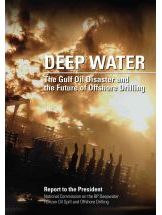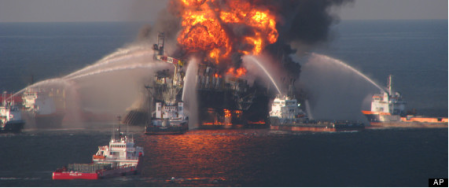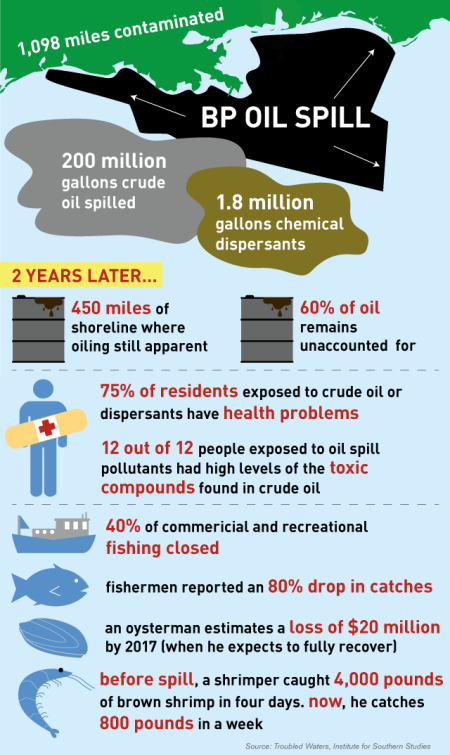As the BP Oil Spill civil trial begins this week, the Federal Government will attempt to prove whether British Petroleum (BP) and/or any of its contractors such as Transocean (RIG), the owner and operator of the Deepwater Horizon oil rig, and Halliburton (HAL), which was responsible for pouring the cement plugs in the well, were “grossly negligent” and thus financially liable in causing the deadly BP Deepwater Horizon offshore oil rig explosion on April 10, 2010, and the blowout of the Macondo well.
Image: Explosion of the BP Deepwater Horizon rig at the Macondo prospect well. Photo credit: Associated Press.
The initial explosion killed 11 oil rig workers and triggered a subsequent oil spill which dumped millions of barrels of crude oil into the Gulf of Mexico, with the full extent of the long-term ecological and economic damage to the Gulf states and aquatic and wildlife still unknown. With tar balls linked to the BP oil spill still washing ashore from Louisiana and Alabama to as far away as Australia, if BP is found “grossly negligent” instead of “simply negligent,” it will be on the hook for $17.6 billion in additional clean-up costs on top of the $4.5 billion fine for the criminal case settled in November 2012.
The National Commission on the BP Deep Water Horizon Oil Spill and Offshore Drilling produced two landmark and controversial reports about the oil spill causes and consequences that are critical in understanding the Government’s case against BP:
1) Macondo: The Gulf Oil Disaster. Chief Counsel’s Report 2011, and
THE MISSION
Established by Executive Order 13543 on May 21, 2010 by President Barack Obama, the mission of the National Commission on the BP Deep Water Horizon Oil Spill and Offshore Drilling Commission was to examine the relevant facts and circumstances concerning the root causes of the Deepwater Horizon explosion and develop options to guard against, and mitigate the impact of, any oil spills associated with offshore drilling in the future.
 In addition, they were to recommend any needed improvements to Federal laws, regulations, and industry practices concerning the oil and gas industry.
In addition, they were to recommend any needed improvements to Federal laws, regulations, and industry practices concerning the oil and gas industry.
Image: Commissioners of the National Commission on the BP Deep Water Horizon Oil Spill and Offshore Drilling. Image credit: C-SPAN
Key areas of inquiry for the Commission included:
- The Macondo Well Explosion and Drilling Safety
- The Role of Offshore Oil Drilling in Domestic Energy Policy
- Regulatory Oversight of Offshore Drilling
- Oil Spill Response
- Spill Impacts and Assessment
- Restoration Approaches and Options
THE INVESTIGATION
 The first order of business for the Commission was to carry out the directive in the Executive Order to “examine the relevant facts and circumstances concerning the root causes of the Deepwater Horizon oil disaster.” They instructed the Commission‘s Chief Counsel Fred Bartlit and his investigative team to provide “the most comprehensive, coherent, and detailed account of the events leading up to the blowout and explosion” of Macondo, the name of BP’s offshore prospect in the Gulf of Mexico in the sector called the Mississippi Canyon Block 252, or MC252 where BP was drilling at the time of the accident.
The first order of business for the Commission was to carry out the directive in the Executive Order to “examine the relevant facts and circumstances concerning the root causes of the Deepwater Horizon oil disaster.” They instructed the Commission‘s Chief Counsel Fred Bartlit and his investigative team to provide “the most comprehensive, coherent, and detailed account of the events leading up to the blowout and explosion” of Macondo, the name of BP’s offshore prospect in the Gulf of Mexico in the sector called the Mississippi Canyon Block 252, or MC252 where BP was drilling at the time of the accident.
The result was this report, Macondo: The Gulf Oil Disaster. Chief Counsel’s Report 2011, which provides additional details and documentation supporting the findings in the Commission’s final report.
The respected Library Journal, in selecting the Macondo report as one of its “Notable Government Documents” for 2011, said:
“The National Commission on the BP Deepwater Horizon Oil Spill was created by President Obama and charged with investigating the root causes of the largest accidental marine oil spill in the history of the petroleum industry. The committee concluded that the cause of the blowout was not mechanical. Instead, a number of poor management decisions, combined with an inadequate regulatory structure and an indifferent regulatory agency, overwhelmed the safeguards designed to prevent such disasters. Plenty of illustrations and photographs offer a glimpse into the technology of offshore oil rigs.” – LJ
For trial watchers, this publication is a must-read as much of the initial documentary evidence is included.
THE FINDINGS AND RECOMMENDATIONS
 The second and final report is the best-selling Deep Water: The Gulf Oil Disaster and the Future of Offshore Drilling, Report to the President, January 2011. It not only offers the full account of what happened in the Gulf of Mexico on April 20, 2010 and why, but also offers recommendations on proposed actions, changes in company behavior, reform of government oversight, and investments in research and technology that will be required to avert future disasters.
The second and final report is the best-selling Deep Water: The Gulf Oil Disaster and the Future of Offshore Drilling, Report to the President, January 2011. It not only offers the full account of what happened in the Gulf of Mexico on April 20, 2010 and why, but also offers recommendations on proposed actions, changes in company behavior, reform of government oversight, and investments in research and technology that will be required to avert future disasters.
In Part I: The Path to Tragedy, “Chapters 1 through 3 describe the events of April 20th on the Deepwater Horizon, and, more important, the events leading up to it in the preceding decades—especially how the dramatic expansion of deepwater drilling in the Gulf was not met by regulatory oversight capable of ensuring the safety of those drilling operations.
In Part II: Explosion and Aftermath: The Causes and Consequences of the Disaster, Chapters 4 through 7 lay out the results of the Commission’s investigation in detail, highlighting the crucial policy-related issues: the specific engineering and operating choices made in drilling the Macondo well, the attempts to contain and respond to the oil spill, and the impacts of the spill on the region’s natural resources, economy, and people—in the context of the progressive degradation of the Mississippi Delta environment.
Image: Chart illustrating some of the ongoing effects of the BP Macondo well oil spill two years after the Deepwater Horizon explosion. Infographic credit: ColorLines.com
In the final section, Part III: Lessons Learned: Industry, Government, Energy Policy, Chapters 8 through 10 present the Commission’s recommendations for reforms in business practices, regulatory oversight, and broader policy concerns.
Throughout the book, the Commission makes the case that outlines a number of primary conclusions, including these unsettling findings:
- “The explosive loss of the Macondo well could have been prevented.
- The immediate causes of the Macondo well blowout can be traced to a series of identifiable mistakes made by BP, Halliburton, and Transocean that reveal such systematic failures in risk management that they place in doubt the safety culture of the entire industry.
- Deepwater energy exploration and production, particularly at the frontiers of experience, involve risks for which neither industry nor government has been adequately prepared…
- To assure human safety and environmental protection, regulatory oversight of leasing, energy exploration, and production require reforms even beyond those significant reforms already initiated…to ensure [the regulators’] political autonomy, technical expertise, and their full consideration of environmental protection concerns.
- Because regulatory oversight alone will not be sufficient to ensure adequate safety, the oil and gas industry will need to take its own, unilateral steps to dramatically increase safety…
- The technology, laws and regulations, and practices for containing, responding to, and cleaning up spills lag behind the real risks associated with deepwater drilling…
- Scientific understanding of environmental conditions in sensitive environments in deep Gulf waters, along the region’s coastal habitats, and in areas proposed for more drilling, such as the Arctic, is inadequate. The same is true of the human and natural impacts of oil spills.”
Delivered to the President on January 2011, the final report starts with a poignant dedication “to the 11 men who lost their lives on the Deepwater Horizon rig on April 20, 2010 and to their families, in hope that this report will help minimize the chance of another such disaster ever happening again.”
Will it help prevent another such disaster? Read these publications and decide for yourself.
How can I buy these BP oil spill publications?
- Buy them online 24/7 at GPO’s Online Bookstore at http://bookstore.gpo.gov:
- Buy the PRINT Editions:
- Buy the EBOOK Editions:
- Buy them at GPO’s retail bookstore at 710 North Capitol Street NW, Washington, DC 20401, open Monday–Friday, 9 a.m. to 4 p.m., except Federal holidays, (202) 512-0132.
- Find them in a federal depository library.
About the Author: Michele Bartram is Promotions Manager for GPO’s Publication and Information Sales Division in Washington, DC, and is responsible for online and offline marketing of the US Government Online Bookstore (http://bookstore.gpo.gov) and promoting Federal government content to the public.



I am truly glad to read this web site posts which contains lots of helpful information,
thanks for providing these data.
LikeLike
[…] Check out Government Printing Office blog on BP Gulf Oil spill. The National Commission on the BP Deep Water Horizon Oil Spill and Offshore Drilling produced two landmark and controversial reports about the oil spill causes and consequences that are critical in understanding the Government’s case against BP: 1) Macondo: The Gulf Oil Disaster. Chief Counsel’s Report 2011, and 2) Deep Water: The Gulf Oil Disaster and the Future of Offshore Drilling, Report to the President, January 2011. https://govbooktalk.gpo.gov/2013/02/25/bp-in-hot-water-over-deepwater/ […]
LikeLike
Those are devastating statistics. I hadnt seem them before, thanks for posting.
LikeLike
[…] in its role in the Deepwater Horizon accident and subsequent Macondo well oil spill, read our Government Book Talk blog post about two best-selling publications from the National Commission on the BP Deep Water Horizon Oil […]
LikeLike
it is okay
LikeLike
Disaster, Stabilizer, And Organizer…….!
We must be appreciate to the U.S. Commission’s investigation that their work, and does not wrong if we ultimatum to decision makers in this planet are seriously protecting our environment together…!
LikeLike